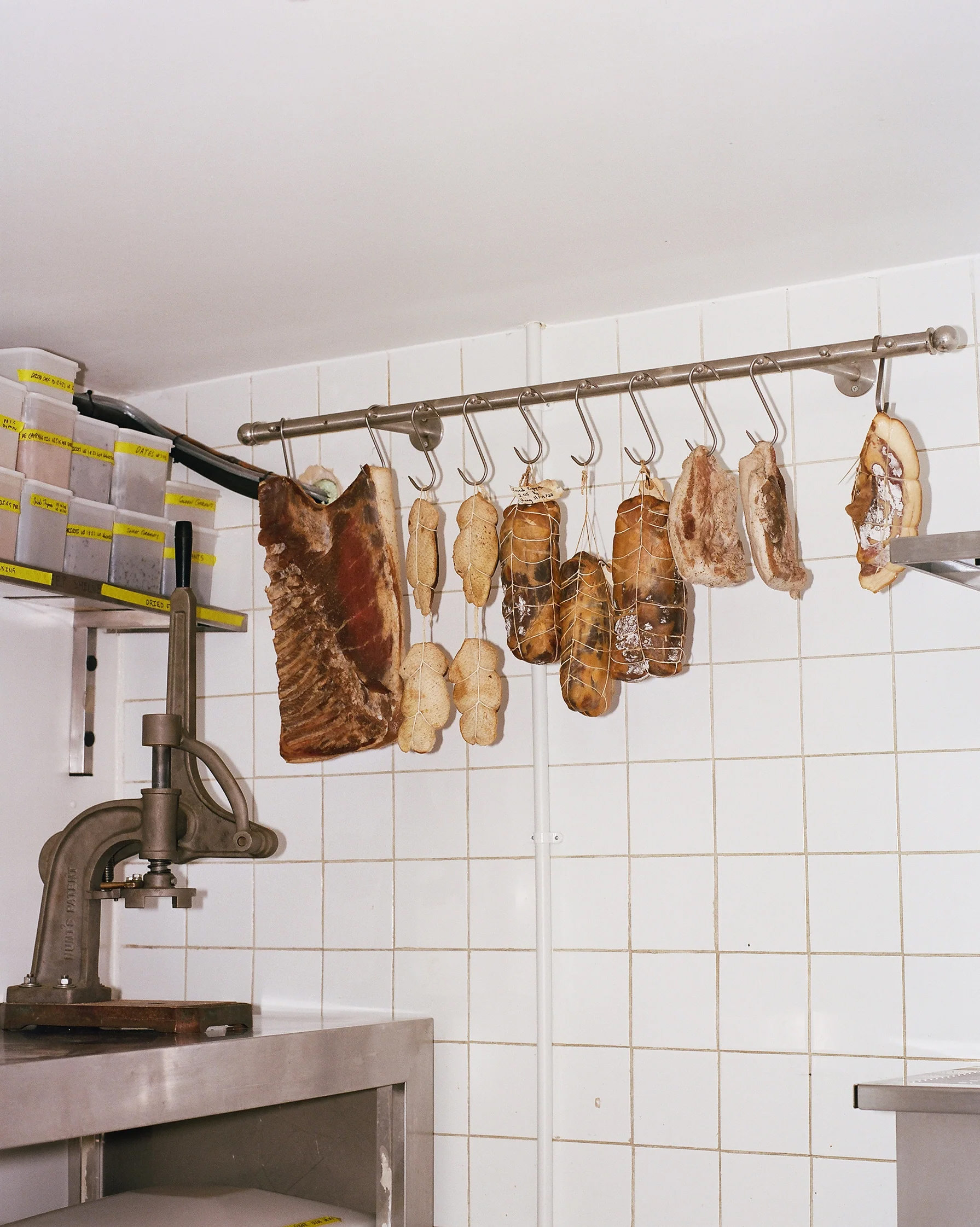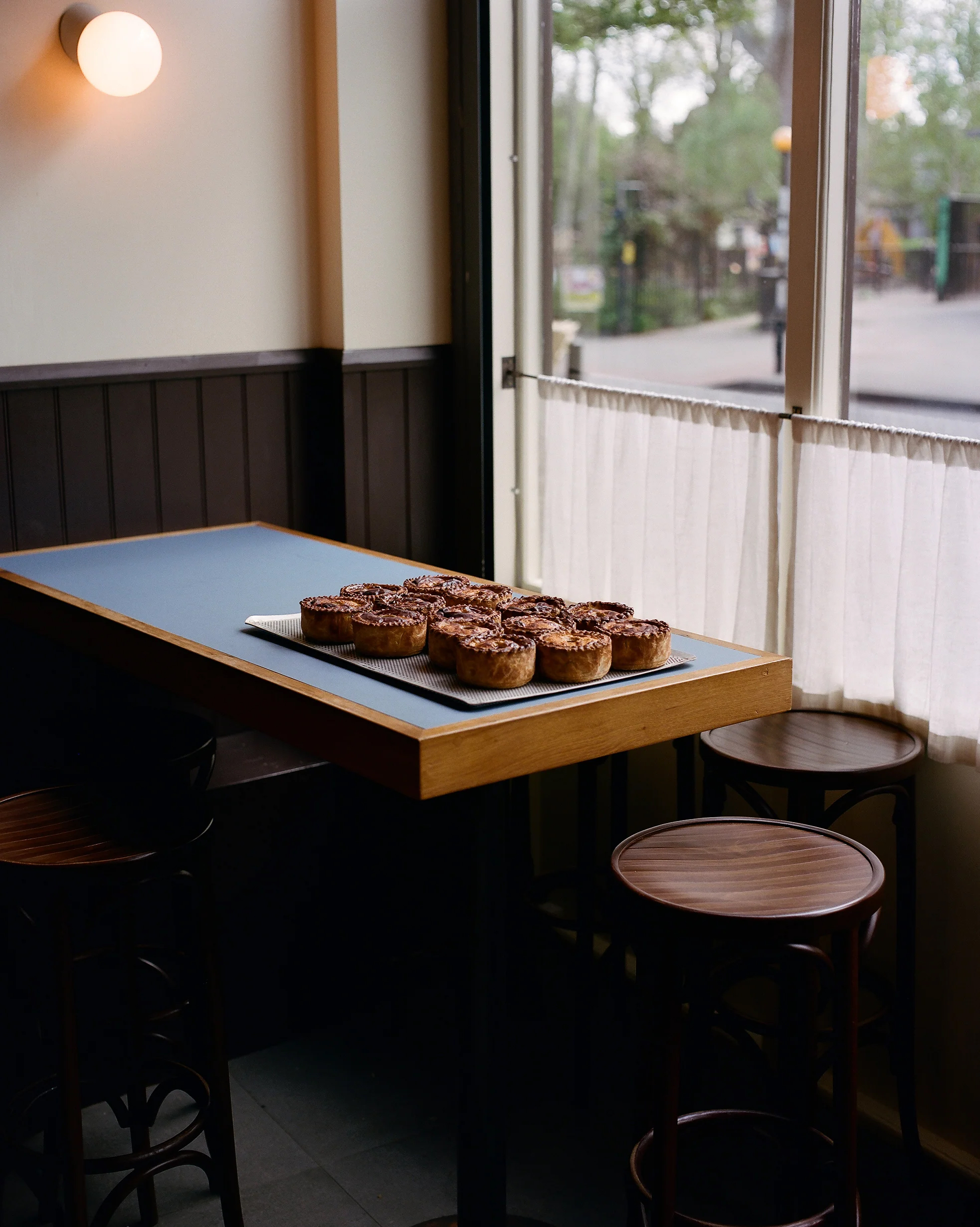Close

Charlie Teasdale is a writer, editor, stylist and consultant, based in London.
He is the former style director of Esquire and former editor of Esquire’s Big Watch Book.
He has contributed to the Wall Street Journal, GQ, the Financial Times, Men’s Health, The Times, The Week, and The Telegraph, among other titles. He is the host of the Crossroads Podcast for Giorgio Armani, and has worked with brands including Matches Fashion, Mr Porter, Crockett & Jones, Oliver Spencer, and Drake’s.
︎
WRITING | DRAKE’S
Article for drakes

The pork pie is humble in its complexity. In the wrong hands - where it is most often found - it can be a clammy, indecorous thing. The shoddy third act of a disappointing meal-deal, or an anaemic lunk in need of a liberal schmear of hot mustard just to give it some minerals. But done right, it is a Dickensian triumph of texture and depth: the chorus, middle-eight and crescendo all rolled into one, and a feat of aged savoir-faire. Too much? Maybe, but you’d understand if you’d ever had one of George Jephson’s pork pies.

Jephson is based at Cadet, a neighborhood spot in the leafy North London enclave of Newington Green. The restaurant has been a smash since it opened in late summer last year - a trend that shows no sign of wavering - but Jephson’s own star is rising, too. He is, many experts say, London’s foremost maker of classic French charcuterie, meaning he takes the oft-overlooked cuts of meat and through a series of intricate processes, turns them into divine dishes that go perfectly with the wine sold upstairs, or any bev you care to pair. Mousse de canard, for example, or jambon persillé, pâté de campagne, fromage de tête… the occasional sausage. All by hand, from scratch, the old way.

“I never want to be chef-y about it,” he says, sitting in a prep room at Cadet, various bits of animal hanging on a hook behind him. “I like the idea of having something that’s not trying to reinvent anything, I don’t have to put my stamp on anything. It’s all there, and about respect for the classic dishes.”
Jephson’s career began in his late teens at a cheesemonger, then a stint at Billingsgate market and a subsequent job as a fishmonger in Hammersmith. Then a couple of years in Paris, where he lived above a traiteur-charcuterie in the 19th arrondissement called Isabelle & Franck. (The concept of a traiteur, a delicatessen serving only dishes from an expansive, classic repertoire made in-house, is fairly unique to France, and certainly not something we have in the UK.)
Jephson’s career began in his late teens at a cheesemonger, then a stint at Billingsgate market and a subsequent job as a fishmonger in Hammersmith. Then a couple of years in Paris, where he lived above a traiteur-charcuterie in the 19th arrondissement called Isabelle & Franck. (The concept of a traiteur, a delicatessen serving only dishes from an expansive, classic repertoire made in-house, is fairly unique to France, and certainly not something we have in the UK.)

“Tiny shop with four women that worked in the front and their four husbands working in the back making everything,” he says. “It was as typical and old fashioned as you could ever want. I went in there every day and because I didn’t have any money they’d give me the ‘talons’, which are the end pieces of each thing, for free. All the gnarly bits, all the jelly.” Only in Paris could a ‘gnarly talon’ be a thing of delectation, but delectable it was. Jephson marveled at the wonders under the counter like a kid gawping at an aquarium.
Back in the UK, still only in his early twenties, Jephson turned his hand to butchery, and stayed the course for four years. But things eventually plateaued. He knew he wanted to make/source/sell/eat great food, but he needed to somehow tie everything together.
Back in the UK, still only in his early twenties, Jephson turned his hand to butchery, and stayed the course for four years. But things eventually plateaued. He knew he wanted to make/source/sell/eat great food, but he needed to somehow tie everything together.

Then he remembered the talons!... I suggest, to which he smiles politely. But a trip to France did rekindle his interest in classical cooking and ended in a job interview in Paris, with Gilles Verot, an icon of the charcuterie scene and a specialist in pâté-en-croûte, the coarse, cuboidal pate encased in thick, crusty pastry.
Due to unforeseen circumstances, Jephson’s move back to Paris was cut short and he had to head back to the UK, but the die was cast and he set to self-teaching the ways of charcuterie from books. He was unemployed and spent every day in the kitchen at home, learning the craft.
Due to unforeseen circumstances, Jephson’s move back to Paris was cut short and he had to head back to the UK, but the die was cast and he set to self-teaching the ways of charcuterie from books. He was unemployed and spent every day in the kitchen at home, learning the craft.

Over lockdown, Jephson briefly returned to butchery and hand-delivered steaks, chickens etc to a discerning few. Every week he’d make a terrine or pate, and the response was positive. Interest grew, more products emerged from George’s kitchen; interest grew further.
Eventually, he needed a dedicated space to keep things going, which is how he came to be in Newington Green. A chance encounter with wine-importers Tom Beattie and Fran Roberts turned out to be a match made in heaven. “They were looking for a bar, [and I needed a space to work] and we decided it could be the perfect marriage. We just wanted to make a French pub, effectively.”
Cadet opened in August 2022 and was voted Eater’s restaurant of the year just four months later. You can’t book, so there are always queues snaking down the street. And when I visited George in early May, the team were still reeling from a recent guest-chef event with Brat’s Tomos Parry. People waited hours for that one.
Eventually, he needed a dedicated space to keep things going, which is how he came to be in Newington Green. A chance encounter with wine-importers Tom Beattie and Fran Roberts turned out to be a match made in heaven. “They were looking for a bar, [and I needed a space to work] and we decided it could be the perfect marriage. We just wanted to make a French pub, effectively.”
Cadet opened in August 2022 and was voted Eater’s restaurant of the year just four months later. You can’t book, so there are always queues snaking down the street. And when I visited George in early May, the team were still reeling from a recent guest-chef event with Brat’s Tomos Parry. People waited hours for that one.

The concept at Cadet is indeed that of a French pub, only better. An expertly curated, undulating wine list, from which you can takeaway, is offset by a menu of concise, elegant plates of classically-skewed food conceived by chef Jamie Smart, which is in turn complimented by Jephson’s charcuterie, and that can be taken away, too. “Cadet is a wine bar, a restaurant, a charcutier, and a shop front,” explained Eater in its award, “one that feels French; that feels London; and, from the moment it opened, just felt right.”
Much like Yohan Lastre, Jephson’s signature dish is his pâté-en-croûte, which is, it seems, the zenith of charcuterie savoir-faire: inexpensive cuts, brought together with delicate care and made into something mind-boggling. His recipe includes pork shoulder, belly, jowl and leg, confited chicken and duck legs, a ‘gracon’ of roasted chicken and duck skin (“like a pork scratching”) brined peppercorns, dried fruit, cognac and a thick, gelatinous stock to fill gaps. (There’s more, but it would be wrong to divulge everything.) All encased within an ornate, crenelated pâte-brisèe, a short pastry made with garlic-infused duck fat. It is literally a thing of beauty.
Much like Yohan Lastre, Jephson’s signature dish is his pâté-en-croûte, which is, it seems, the zenith of charcuterie savoir-faire: inexpensive cuts, brought together with delicate care and made into something mind-boggling. His recipe includes pork shoulder, belly, jowl and leg, confited chicken and duck legs, a ‘gracon’ of roasted chicken and duck skin (“like a pork scratching”) brined peppercorns, dried fruit, cognac and a thick, gelatinous stock to fill gaps. (There’s more, but it would be wrong to divulge everything.) All encased within an ornate, crenelated pâte-brisèe, a short pastry made with garlic-infused duck fat. It is literally a thing of beauty.

“George has an old soul when it comes to turning his hands to the work of a charcutier,” says Patricia Michelson, founder of London cheesemonger and delicatessen, La Fromagerie, and the first person to stock Jephson’s products. “He takes humble and often overlooked parts of the animal and makes them into exquisite 'confections' harking back to time honoured practices that require patience and precision in accomplishing. There is no one that I know of in the UK who produces this work with the same high quality and deft palate enhancement. Britain is rearing amazing animals, and growing ancient grains and in the capable hands of George they become the sum of all their parts.”

In December alone, in addition to everything else, Jephson and his burgeoning team put out 300kg of pâté-en-croûte, and it is on the menu at restaurants including Bibendum and Wild Honey, both of which have Michelin-stars.
And now there’s a pork pie, too, which, Jephson says, is essentially the British equivalent of pâté-en-croûte. In the wake of Brexit, perhaps in an attempt to keep some kind of connection, he became obsessed with French food, and that passion remains, but now the dust has (somewhat) settled, he’s looking closer to home. It’s taken a while to dial-in - “there’s nowhere to hide” with a pork pie, says Jephson - but he’s settled on a recipe. And now it's about consistency.
But in the way only French cooking can be, the process is open-ended. “There are basics, but the savoir-faire - the know-how - you never stop learning,” he says. “And you can’t learn it directly. You learn by doing, and failing.”
(Incidentally, Michelson calls it a “masterpiece”.)
And now there’s a pork pie, too, which, Jephson says, is essentially the British equivalent of pâté-en-croûte. In the wake of Brexit, perhaps in an attempt to keep some kind of connection, he became obsessed with French food, and that passion remains, but now the dust has (somewhat) settled, he’s looking closer to home. It’s taken a while to dial-in - “there’s nowhere to hide” with a pork pie, says Jephson - but he’s settled on a recipe. And now it's about consistency.
But in the way only French cooking can be, the process is open-ended. “There are basics, but the savoir-faire - the know-how - you never stop learning,” he says. “And you can’t learn it directly. You learn by doing, and failing.”
(Incidentally, Michelson calls it a “masterpiece”.)

writer - editor - stylist
© 2025 Charlie Teasdale